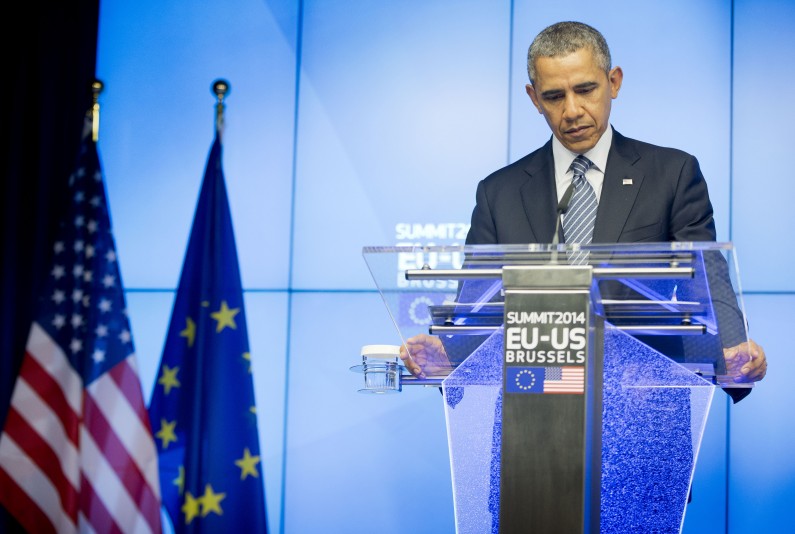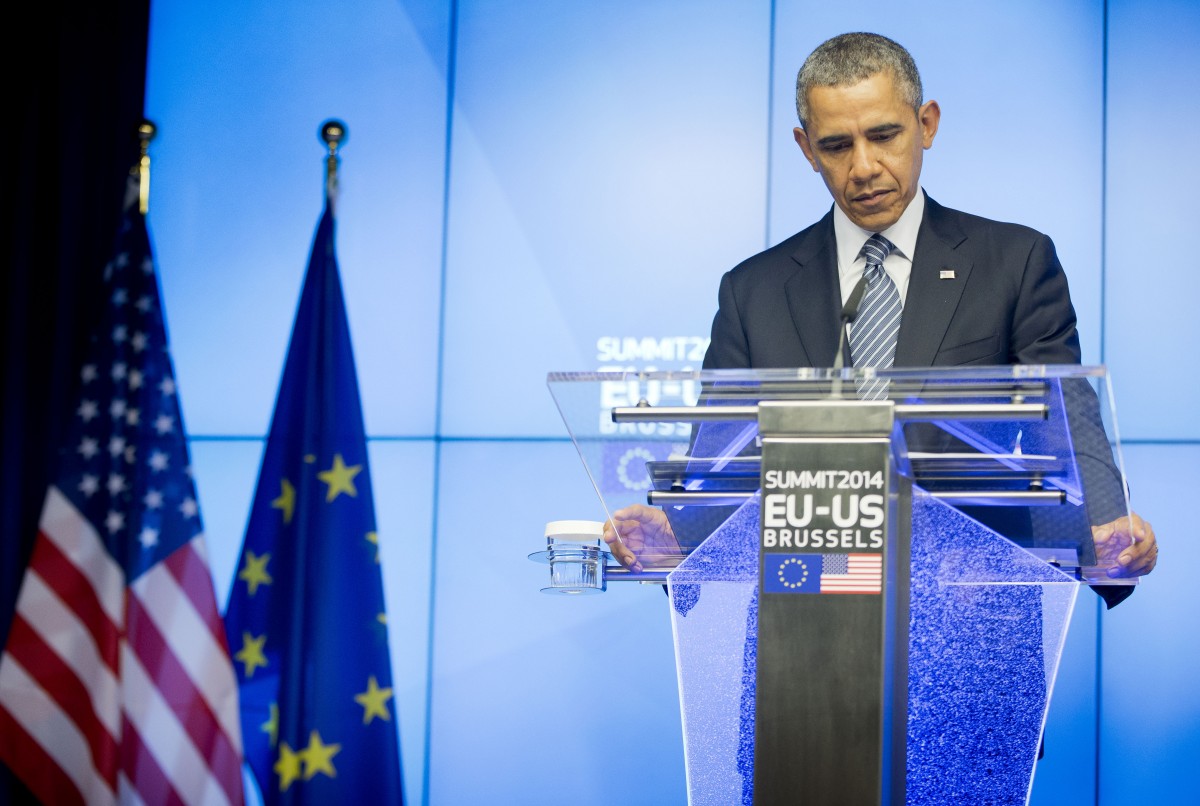
BRUSSELS — The people of Brussels, the capital of the Kingdom of Belgium, will long remember President Barack Obama’s visit and the ensuing chaos.
There was the guy shouting to police that he did not want to be locked up in the park with his daughter the whole afternoon, and the old lady who had to walk about 1,000 meters around the park just to cross the street and shouted that Obama was a “cornichon,” or twit.
There were all the officials working in the ministries, trying to get to the Central Train Station to catch a train and go home after a day of work, who found themselves blocked out instead. Mothers wanted to pick up their children and started panicking when they realized there was no way they could reach the school. The Brussels main Court of Justice even had to postpone hearings because people were stuck in the park — they tried showing their summons to police, but to no avail.
The list of people blocked or trapped somewhere in town because of the very tight security measures was endless, and something unseen by the over 1 million inhabitants of Brussels. The city, despite hosting the European Union institutions and the NATO headquarters, is in general fairly relaxed in terms of security. Belgians are famous for not taking themselves too seriously and they are pretty easygoing. Most of the time, there is not a single police officer to be spotted in the EU institutions quarter.
Even when EU summits are organized, when heads of states and governments of the 28 member states meet, the atmosphere is pretty relaxed.
But security measures such as the ones deployed for President Obama’s first-ever visit to Brussels were unprecedented. He arrived with a 900-person delegation, three planes, 45 vehicles and a few helicopters. Additionally, 1,500 Belgian police officers were mobilized. And the people of Brussels saw something they had never seen before in the city: rooftop snipers.
The result was that many parts of the city were completely locked up for a few hours. What made matters worse is that, for the same security reasons, the itinerary taken by the U.S. president was only known at the last minute, catching people by surprise and essentially trapping them.
“Aren’t we exaggerating with security?” wondered one of the two main national newspapers.
A public image fiasco?
The people of Brussels had a hard time accepting the surprise security precautions.
“I was glad I did not have to move around Brussels,” Inger-Lise Ostrem, a Norwegian conference interpreter who has been living in Belgium for years, told MintPress News. “As a Norwegian, I cannot help but recall that back in the late 80s, when I was living in Norway, I often took the same train as the prime minister. No fuss, no security measures there.”
“I think that in terms of public image, his visit was a fiasco” said Linda Mondry, a self-described “free, not free-lance, journalist.” “If this is the habit in the United States, it is definitely not so in Belgium. It is not the mentality. This is inappropriate and rude. We are not his enemies, yet this is the impression we got when we were in the streets.”
People were not the only ones to protest, however. Amnesty International organized an event in front of the EU building, asking for human rights to be put at the heart of the U.S.-EU bilateral discussions. The organization wanted to draw attention to the fact that four years after the announcement that Guantanamo Bay detention camp would be closed, there still are 150 detainees imprisoned there. Amnesty International also criticized the United States’ lack of transparency in the use of drones and its continued use of the death penalty at the federal level.
Several peace organizations organized a symbolic action: they offered a nuclear bomb made of chocolate to Belgian Prime Minister Elio Di Rupo, asking him to give it to the American president. They were asking the prime minister to put the removal of American nuclear weapons from the Kleine Brogel Air Base on the agenda of the talks with the U.S. president. The Belgian government has always refrained from officially admitting the presence of these weapons dating back to the 1960s, but WikiLeaks and other research have undeniably confirmed that they are there.
There were also protesters demonstrating against the Transatlantic Trade and Investment Partnership (TTIP) currently being negotiated between the EU and the U.S., and a few protesters from the Belgian chapter of the Free the Cuban Five Committee were also in attendance. But it is unlikely that the American president saw any of them.
Aside from the demonstrators, many Belgians were excited to see the American president and hoped to catch of glimpse of him. “He looks so nice, so elegant,” one on-looker commented.
“He is both capable of having incredibly inspirational speeches including complex macroeconomic elements and of coming across as a simple and accessible human being,” Marilyn Vanbesien, an executive coach, told MintPress, adding, “He gives us enough insights into his private life for us to be able to relate, and not enough to judge. He is a clever and sensitive man.”
On the morning of March 26, President Obama, accompanied by Prime Minister Di Rupo and King of Belgium Philippe, visited the Flanders Field American Cemetery and Memorial in Waregem, where 368 American servicemen are buried, and paid tribute to World War I soldiers. Obama concluded his remarks at the cemetery by saying “this visit, this hallowed ground, reminds us that we must never, ever take our progress for granted. We must commit perennially to peace, which binds us across oceans.”
Underlining the shared values
After visiting the cemetery, he then went to the European Union for a discussion with European leaders, followed by a talk in his hotel with Anders Fogh Rasmussen, NATO’s secretary general. But the key moment of his visit in the Belgian capital was probably the speech he gave before 2,000 guests, mainly young people, in Brussels’ Center for Fine Arts.
He addressed the situation in Ukraine and the recent events in Crimea, speaking of “Russia’s violation of international law, his assault on Ukraine’s sovereignty and territorial integrity.” He also referred to the historical links between the two continents, speaking of a “shared vision of Europe, a vision based on representative democracy, individual rights.”
“His speech choked and upset me,” Marianne Blume, a retired teacher, told MintPress. “How dare he speak about dignity and liberty, when there is still Guantanamo, the death penalty, when U.S. drones strike indiscriminately in Afghanistan and elsewhere. He is avoiding the sensitive questions and claims, like other American presidents, to defend democracy, whereas, in reality, this is not the case.”
Belgium is well-known for being a country of compromise. It has had to reconcile the French-speaking southern part of the country, Wallonia, with the Flemish-speaking north, Flanders, and Brussels – officially bilingual – is caught in the middle. In this country, the preferred solution to any problem is to draft a text so ambiguous that everyone can claim victory and so vague that nobody is offended — a far cry from the “bad guy” approach that so often seems to prevail in U.S. foreign policy.
“The people here, they want to live free and in peace. I mean, really,” said Linda Mondry. “Not in this sort of schizophrenia in which leaders put them, and where they see enemies everywhere”.
For the average Belgian, though, Obama will probably remain the nice and elegant smiling president who thanked the Belgians for their “wonderful hospitality” and admitted that “it is easy to love a country famous for chocolate and beer.” To round out the cliche, he would have just needed to add waffles and frites, or Belgian fries, to that list.
“He knows how to charm his audience and smiles profusely,” wrote Belgian journalist Olivier Le Bussy.
“There is not a single European leader that has half of his charms. Obama is one of these political leaders who would manage to captivate their audience with the reading of the instructions for use of a washing machine.”


